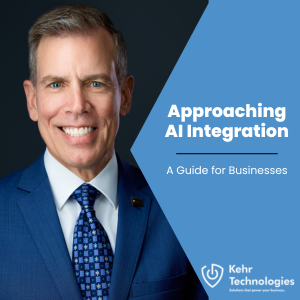 AI can be a powerful tool for businesses of all sizes, but it's important to approach its integration thoughtfully and strategically. For businesses to successfully integrate AI, they must first examine their business operations, marketing, and customer service to find their weaknesses and gaps. Once these areas are identified, businesses can then determine if and where AI can make a difference.
AI can be a powerful tool for businesses of all sizes, but it's important to approach its integration thoughtfully and strategically. For businesses to successfully integrate AI, they must first examine their business operations, marketing, and customer service to find their weaknesses and gaps. Once these areas are identified, businesses can then determine if and where AI can make a difference.
Getting Started with AI
When beginning your AI journey, it's recommended to "start small, but think big". Use small projects and early wins to learn about the technology and determine if it's making a difference for your business. It's crucial to have clear objectives and ensure the AI is helping you meet them. Once you've had some success, you should always refine and review your strategies to keep moving forward.
A critical step in this process is ensuring your staff understands AI. Investing in AI literacy for your employees is important because it takes the business forward in the right direction, even if you aren't using the technology yet.
AI and Cybersecurity
While malicious actors are using AI to create more sophisticated phishing emails and other attacks, cybersecurity vendors are also leveraging AI to improve their solutions. AI-powered cybersecurity solutions can detect unusual activity on a computer and automatically respond by shutting down or isolating the device from the network within seconds, a process that would take a human much longer. Additionally, AI can identify unusual login attempts, such as a login from a new location or "impossible travel" scenarios where a user logs in from two geographically distant locations in a short period, and block them. This kind of AI-driven intelligence can stop cybercriminals from accessing your accounts.
Data Privacy and Ethical Considerations
When implementing AI solutions, it's vital to know what data the AI has access to. A strict policy is to not inject any customer data into AI, as it runs the risk of being exposed to the rest of the world. This is especially true for publicly available AI engines like ChatGPT, where any information you input can become accessible to others.
To ensure the safe and responsible use of AI, businesses should create clear policies for employees. These policies should outline what is and is not acceptable use of AI tools for business purposes and what data should be used. It's also important to monitor how employees are using these tools and what data is being injected into them. In addition to policies, educating employees on the risks and their responsibilities is one of the most important things a business can do.
The Ongoing Role of Humans
Despite the growing capabilities of AI, human involvement remains crucial. AI doesn't always understand context, cultural sensitivities, or have the ability to be empathetic. For example, AI might not detect when a customer is angry during a call, which is where human interaction is invaluable.
Furthermore, AI can generate answers that are completely false, so human quality control is essential to verify the information and ensure its accuracy. AI also lacks strategic thinking and ethical judgment. Business owners must use the data from AI to do their own strategic thinking and ensure the ethical use and exposure of customer and employee data.





